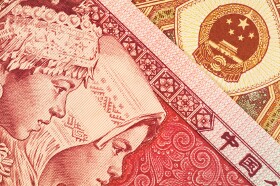The Chinese yuan is rebounding against a basket of currencies on Tuesday after the federal government injected tens of billions of dollars into the national economy. Despite bearish forecasts and tumbling Asian stocks, the currency has strengthened, but it is still near a multi-year low.
Beijing reduced the amount of cash that financial institutions are required to maintain in reserves. The Peopleâs Bank of China (PBOC) slashed the reserve requirement ratios (RRRs) by 1% to cut financing costs for large and small commercial lenders that will go into effect October 15. The injection of cash will be equal to $109.2 billion, a move that is meant to stimulate the worldâs second-largest economy and offset the negative effects of higher US tariffs on Chinese goods.
Xu Hongcai, deputy chief economist at the China Center for International Economic Exchanges think tank, called the move âvery timely.â
The trade warâs impact on the economy is showing. There is room for further reductions and I expect another one percentage point cut by the year-end.
The stimulus could not give Asian markets a shot in the arm because stocks have fallen to 17-month lows. There could be two things: Investors realize that the economy is in worse shape than what officials will concede, or they fear that the International Monetary Fund (IMF)âs forecast are correct.
According to the IMF, Chinese gross domestic product (GDP) will be lower at 1.6% next year. It estimated that world growth will remain a healthy 3.7%, but this was revised downwards by 0.2%.
This comes after an IMF official told reporters at the IMF and World Bank meetings in Bali that he is not concerned that the government cannot defend the yuan.
They do have to balance those actions against the need to achieve a more stable financial sector, to achieve more deleveraging, and they have to exert better control over local government financing. It’s definitely going to be a balancing act for them.
The Trump administration reiterated that it is keeping a close eye on the yuanâs depreciation. Treasury Secretary Steven Mnuchin stated that the US government is monitoring the situation and will examine the subject at this weekâs conference of finance ministers in Bali. Washington has repeatedly accused Beijing in recent years of weakening the yuan to boost exports and undermine the US economy.
Most experts agree that the government has not artificially debased the yuan. The trade war has produced a series of consequences for the Chinese economy, leading to a slowdown in manufacturing growth and an increase in debt â both government and household.
The USD/CNY currency pair slid 0.11% to 6.9228, from an opening of 6.9307, at 16:00 GMT on Tuesday. The EUR/CNY fell 0.18% to 7.9505, from an opening of 7.9651.
If you have any questions, comments or opinions regarding the Chinese Yuan,
feel free to post them using the commentary form below.



Be First to Comment